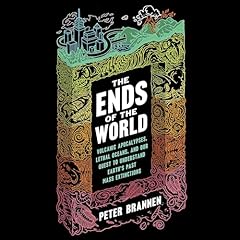
The Age of Reptiles
The History and Legacy of the Mesozoic Era and the Dinosaurs
No se pudo agregar al carrito
Add to Cart failed.
Error al Agregar a Lista de Deseos.
Error al eliminar de la lista de deseos.
Error al añadir a tu biblioteca
Error al seguir el podcast
Error al dejar de seguir el podcast
 Exclusivo para miembros Prime: ¿Nuevo en Audible? Obtén 2 audiolibros gratis con tu prueba.
Exclusivo para miembros Prime: ¿Nuevo en Audible? Obtén 2 audiolibros gratis con tu prueba.Compra ahora por $13.55
-
Narrado por:
-
Gregory T. Luzitano
The early history of our planet covers such vast stretches of time that years, centuries, and even millennia become virtually meaningless. Instead paleontologists and scientists who study geochronology divide time into periods and eras.
The current view of science is that planet Earth is around 4.6 billion years old. The first four billion years of its development are known as the Precambrian period. For the first billion years or so, there was no life in Earth. Then the first single-celled life-forms, early bacteria and algae, began to emerge. We don’t know where they came from or even if they originated on this planet at all. This gradual development continued until around four billion years ago when suddenly (in geological terms!) more complex forms of life began to emerge.
Scientists call this time of an explosion of new forms of life the Paleozoic Era and it stretched from around 541 to 250 million years ago (Mya). First of all, in the oceans and then on land, new creatures and plants began to appear in bewildering variety. By the end of this period, life on Earth had exploded into a myriad of complex forms that filled virtually every habitat and niche available in the seas and on the planet’s only continent, Pangea.
Then a mysterious event that became known to early paleontologists as “The Great Dying” wiped out more than 95 percent of all life on Earth. No-one is entirely certain what caused this, but the effect of this cataclysm was as if someone had pressed a great, cosmic “reset” button and it took 30 million years for the development of life on Earth to start again.
©2020 Charles River Editors (P)2020 Charles River EditorsLos oyentes también disfrutaron:




















Good 101 into the Mesozoic
Se ha producido un error. Vuelve a intentarlo dentro de unos minutos.


